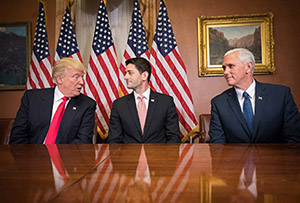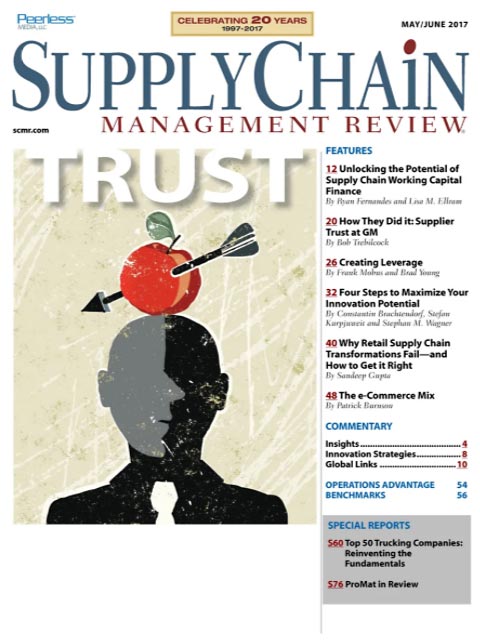Sorry, but your login has failed. Please recheck your login information and resubmit. If your subscription has expired, renew here.
May-June 2017
Trust hasn’t always been an element in supplier relationships; all too often buyers have been encouraged to carry a big stick and get tough with suppliers to get the best price—no matter the cost. That approach to procurement is beginning to change. Browse this issue archive.Need Help? Contact customer service 847-559-7581 More options
We have just come off of a presidential election year in which the political pollsters concur that they really missed the boat. Few (at best) picked Donald Trump to win the election. Countless articles have since been written trying to decipher how the profession could have been so wrong. Business forecasters and planners can learn from their mistakes. They understand that fore¬casts and plans are never perfect; thus they would suspect pollsters are being hard on themselves. However, I believe pollsters (as a whole) did not do a good job—and that there are lessons for forecasters in their results.
When an outcome is binary, such as when calling a coin toss, around half of a group would likely be wrong. So if the election was reasonably close, on average around half of the pollsters should have picked the winner. However, President Trump was a long shot—meaning less than 50% should have picked him. The New York Times and FiveThirtyEight, both respected pollsters, gave Trump a 15% and 29% chance of winning, respectively. I believe the latter was more accurate, but even if the former was, then around 15% of the pollsters should have predicted Trump the winner. The unbelievably minuscule number of pollsters that did predict him to win lends some credence to the pollsters being biased.
My assessment
During one year of my tenure as a business fore¬caster, I forecasted a substantial change in the annual revenue trend of my division. That was a good year for me in that I forecasted a revenue turning point—from low double-digit annual percentage growth to flat revenues. It was a bad year because the executives, managers and co-workers refused to believe the forecast because the division was coming off of multiple years of revenue growth.*

This complete article is available to subscribers only.
Log in now for full access or start your PLUS+ subscription for instant access.
SC
MR
Sorry, but your login has failed. Please recheck your login information and resubmit. If your subscription has expired, renew here.
May-June 2017
Trust hasn’t always been an element in supplier relationships; all too often buyers have been encouraged to carry a big stick and get tough with suppliers to get the best price—no matter the cost. That approach to… Browse this issue archive. Access your online digital edition. Download a PDF file of the May-June 2017 issue.We have just come off of a presidential election year in which the political pollsters concur that they really missed the boat. Few (at best) picked Donald Trump to win the election. Countless articles have since been written trying to decipher how the profession could have been so wrong. Business forecasters and planners can learn from their mistakes. They understand that fore¬casts and plans are never perfect; thus they would suspect pollsters are being hard on themselves. However, I believe pollsters (as a whole) did not do a good job—and that there are lessons for forecasters in their results.
When an outcome is binary, such as when calling a coin toss, around half of a group would likely be wrong. So if the election was reasonably close, on average around half of the pollsters should have picked the winner. However, President Trump was a long shot—meaning less than 50% should have picked him. The New York Times and FiveThirtyEight, both respected pollsters, gave Trump a 15% and 29% chance of winning, respectively. I believe the latter was more accurate, but even if the former was, then around 15% of the pollsters should have predicted Trump the winner. The unbelievably minuscule number of pollsters that did predict him to win lends some credence to the pollsters being biased.
My assessment
During one year of my tenure as a business fore¬caster, I forecasted a substantial change in the annual revenue trend of my division. That was a good year for me in that I forecasted a revenue turning point—from low double-digit annual percentage growth to flat revenues. It was a bad year because the executives, managers and co-workers refused to believe the forecast because the division was coming off of multiple years of revenue growth.*
 SUBSCRIBERS: Click here to download PDF of the full article.
SUBSCRIBERS: Click here to download PDF of the full article.
SC
MR


Latest Supply Chain News
- How CPG brands can deliver on supplier diversity promises
- How S&OP provides the answer to in-demand products
- AI, virtual reality is bringing experiential learning into the modern age
- Humanoid robots’ place in an intralogistics smart robot strategy
- Tips for CIOs to overcome technology talent acquisition troubles
- More News
Latest Podcast

 Explore
Explore
Topics
Latest Supply Chain News
- How CPG brands can deliver on supplier diversity promises
- How S&OP provides the answer to in-demand products
- AI, virtual reality is bringing experiential learning into the modern age
- Humanoid robots’ place in an intralogistics smart robot strategy
- Tips for CIOs to overcome technology talent acquisition troubles
- There is still work to do to achieve supply chain stability
- More latest news
Latest Resources

Subscribe

Supply Chain Management Review delivers the best industry content.

Editors’ Picks





